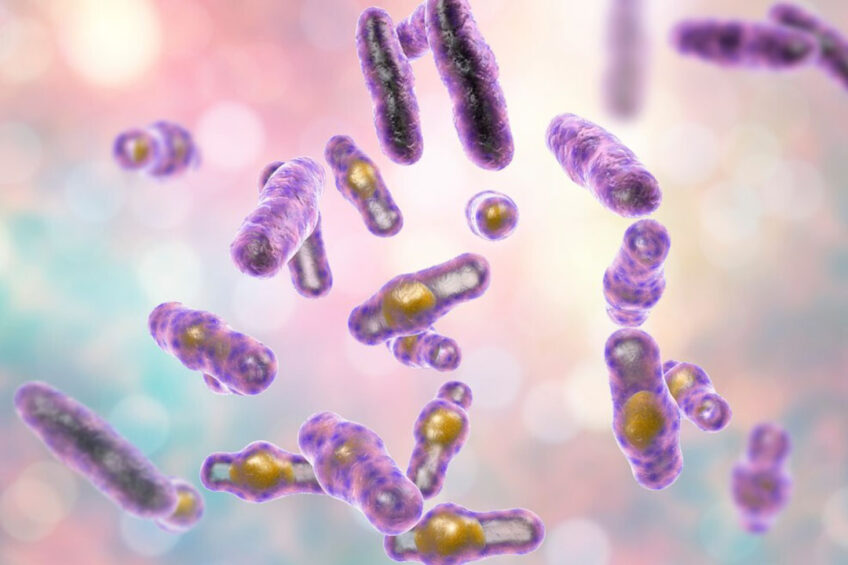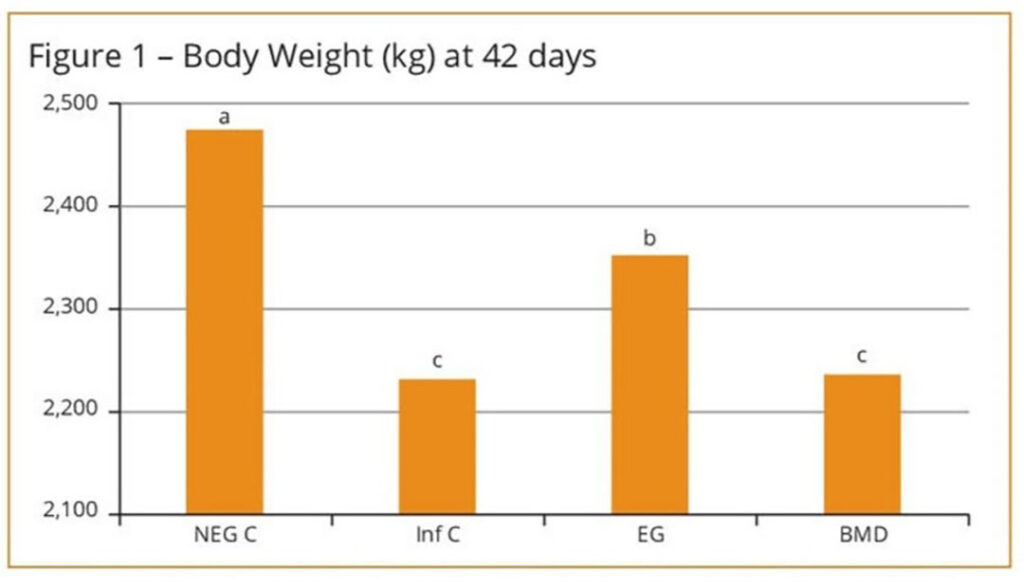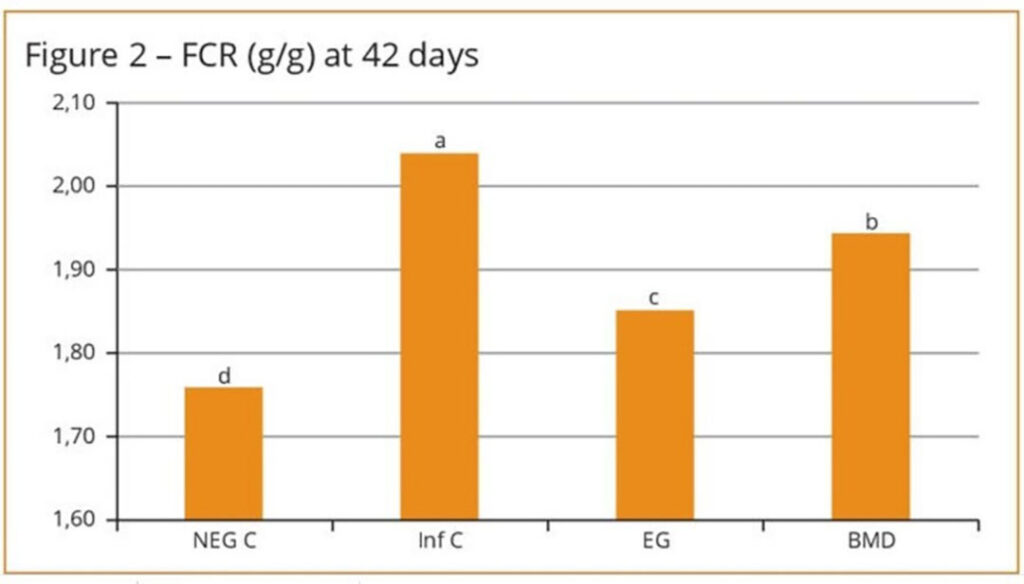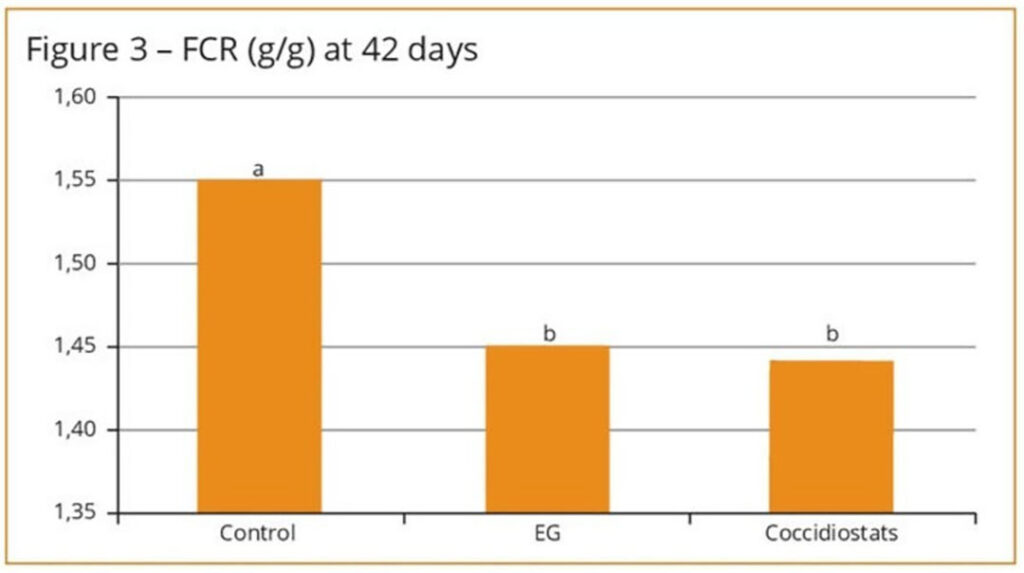Effect of eugenol and garlic compounds on necrotic enteritis challenge

Necrotic enteritis is a major poultry disease leading to huge financial losses globally. The incidence and severity of this pathology have increased over the years. With the need to reduce antibiotic use, the market is asking for new solutions to alleviate the effect of necrotic enteritis while maintaining broiler performance.
Enteric diseases are a major concern for the poultry industry. They lead to production losses, higher mortality rates, reduced poultry welfare and an increased risk of contamination of poultry products for human consumption.
One of the most damaging diseases is necrotic enteritis, which is caused by the over-proliferation of Clostridium perfringens and usually occurs in broiler chickens at 3-4 weeks of age. Necropsy of infected birds reveals typical necrosis in the small intestines.
There are 2 forms of necrotic enteritis. Firstly there is the acute form, which is characterised by a sudden increase in mortality. In most cases, there are no clinical warning signs and it can lead to mortality rates of up to 50%. Clinical signs of diseased animals include depression, dehydration, ruffled feathers, inappetence and diarrhoea.
Conversely, the second form, which is sub-clinical necrotic enteritis often goes undetected and thus untreated by producers. This form of pathology represents 80% of cases and is the most costly for the industry. Difficult to diagnose, it can lead to significant production losses, decreased feed efficiency and negatively impact welfare.
Necrotic enteritis management
Necrotic enteritis is typically managed with antibiotics, some in rotation programme systems. However, the use of antibiotics is being reduced in many regions of the world due to the emergence of antimicrobial resistance. Consumer acceptance of products from antibiotic-fed animals is also decreasing.
To meet the challenge of maintaining broiler performance and limiting necrotic enteritis impact without antibiotic use, producers are increasingly interested in alternative strategies, like feed additives.
Phytogenic molecules, such as eugenol and garlic compounds, have been identified as having interesting properties. Eugenol is a naturally occurring molecule in cloves that has demonstrated its ability to reinforce the gut physical barrier by increasing the thickness of the intestinal mucus layer and decreasing bacterial attachment in the intestinal epithelium.
Several poultry studies have also shown that garlic compounds support immunity parameters by limiting inflammatory processes and promoting optimal gut digestive functions, thereby reducing the number of available nutrients for Clostridium perfringens to grow.
Promising results
In a recent trial performed in Virginia in the US, a blend of eugenol and garlic compounds was compared to Bacitracin Methylene Disalicylate (BMD) and was shown to promote broiler performance when under necrotic enteritis challenge conditions.
This 42-day trial was performed on 1,000 Cobb500 broilers split into 4 groups:
- Negative Controlv (Neg C)
- Infected Control (Inf C)
- Eugenol and garlic compounds (EG; 100 g/t)
- BMD (50 g/t).
At 12 days of age, all birds except the negative control groups were inoculated via oral gavage by titrated Clostridium perfringens culture to mimic a sub-clinical necrotic enteritis challenge.
 The results of this study showed significant improvement in body weight for the group fed eugenol and garlic compounds (+5.5%) compared to infected and non-supplemented birds (Figure 1). Regarding feed conversion, the group fed eugenol and garlic compounds and BMD demonstrated a better feed conversion ratio than the Infected Control (Figure 2).
The results of this study showed significant improvement in body weight for the group fed eugenol and garlic compounds (+5.5%) compared to infected and non-supplemented birds (Figure 1). Regarding feed conversion, the group fed eugenol and garlic compounds and BMD demonstrated a better feed conversion ratio than the Infected Control (Figure 2).Coccidiosis involvement
A major predisposing factor for necrotic enteritis is coccidiosis. It is caused by Apicomplexan parasites of the genus Eimeria which invade the intestinal tract and cause high morbidity, ranging from acute, bloody enteritis with high mortality, to sub-clinical disease.
 Coccidiosis often precedes or occurs concurrently with field outbreaks of necrotic enteritis. To evaluate potential interest in these plant extracts, a trial was set up in the UK comparing a blend of eugenol and garlic compounds to coccidiostats under environmentally induced sub-clinical necrotic enteritis.
Coccidiosis often precedes or occurs concurrently with field outbreaks of necrotic enteritis. To evaluate potential interest in these plant extracts, a trial was set up in the UK comparing a blend of eugenol and garlic compounds to coccidiostats under environmentally induced sub-clinical necrotic enteritis.
The study was performed on 960 Ross308 broilers raised to 35 days of age. Litter was re-used from a previous poultry flock to induce coccidiosis and sub-clinical necrotic enteritis. A total of 3 treatments were tested:
- Control (basal diet)
- A blend of eugenol and garlic compounds (EG; 100 g/t)
- Coccidiostats (narasin and nicarbazin; 60 g/t).
 The results showed a significantly higher body weight for the eugenol and garlic compounds and coccidiostats groups compared to the control birds. Broilers supplemented with eugenol and garlic compounds reached the same feed conversion ratio as the coccidiostat treatment, outperforming the control group (-6.5%) (Figure 3).
The results showed a significantly higher body weight for the eugenol and garlic compounds and coccidiostats groups compared to the control birds. Broilers supplemented with eugenol and garlic compounds reached the same feed conversion ratio as the coccidiostat treatment, outperforming the control group (-6.5%) (Figure 3).
Effective production support
These results suggest that eugenol and garlic compounds may promote optimal performance in broilers under coccidia and necrotic enteritis challenge conditions. These phytomolecules may help to maintain the performance of challenged birds, thereby effectively reducing production costs and increasing the profitability of broiler production in the face of enteric disease risks.
References are available on request.












